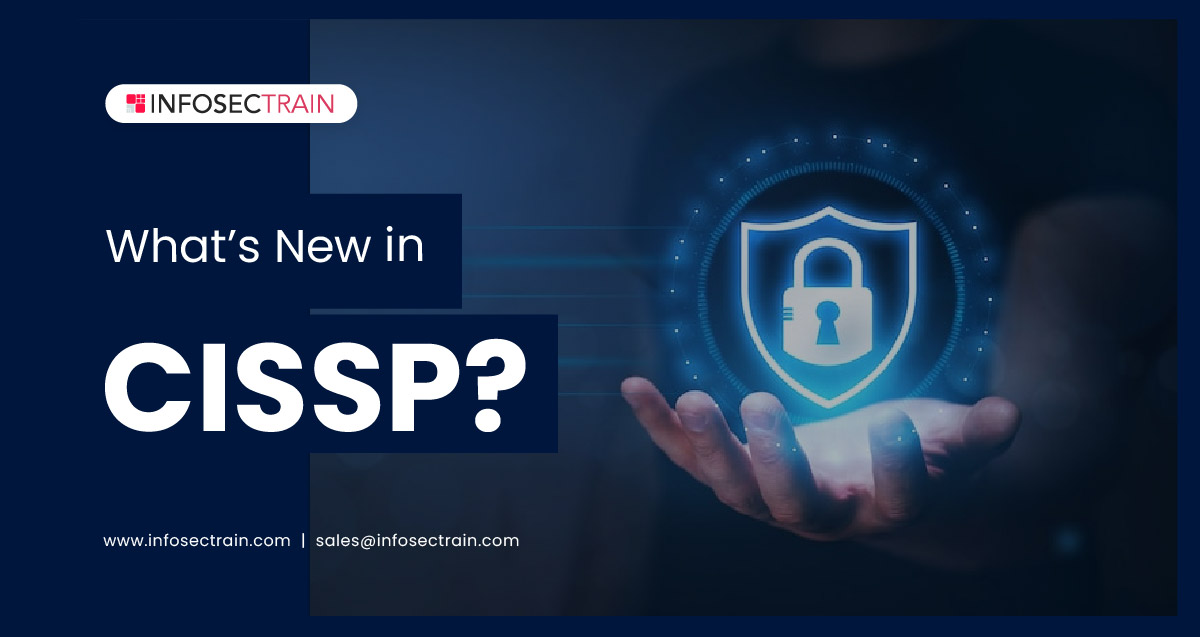What’s New in CISSP?
(ISC)² has refreshed the set of objectives for the CISSP certification exam for security professionals to make it relevant with the latest cybersecurity terms, methods, and technologies. This new version of the CISSP certification exam was revised and modified in 2021, and the preparation for the exam will be more challenging than ever.

This blog will describe the changes in the CISSP exam pattern and domain weightage that a CISSP aspirant has to know to prepare and crack the certification exam.
Table of Contents
Various Job Roles in CISSP
Comparing old CISSP exam details with new CISSP exam details
CISSP Domain Content
CISSP FAQs
The Certified Information Systems Security Professional (CISSP) is an information security certification for Security Analysts. This certification will be held by International Information Systems Security Certification Consortium (ISC)² to cover all current issues with information security. After getting certified, the applicant will have extensive knowledge and expertise in handling information security problems.
Various Job Roles in CISSP
- Security Specialist
- Chief Information Security Officer
- Security System Administrator
- Security Managers
- Security Analysts
- Security Auditors
- Cybersecurity Architects
Comparing old CISSP exam details with new CISSP exam details
Let’s compare the exam details and changes in domain weightage with the percentage.
Exam Details
| Old CISSP | New CISSP | |
| Length of exam | 3 hours | 4 hours |
| Number of questions | 100-150 | 175 |
| Type of questions | Multiple choice | Multiple choice |
| Passing score | 700 out of 1000 points | 700 out of 1000 points |
Domain Weightage
| Old CISSP | % | New CISSP | % |
| Security and Risk Management | 15% | Security and Risk Management | 15% |
| Asset Security | 10% | Asset Security | 10% |
| Security Architecture and Engineering | 13% | Security Architecture and Engineering | 13% |
| Communication and Network Security | 14% | Communication and Network Security | 13% |
| Identity and Access Management | 13% | Identity and Access Management | 13% |
| Security Assessment and Testing | 12% | Security Assessment and Testing | 12% |
| Security Operations | 13% | Security Operations | 13% |
| Software Development Security | 10% | Software Development Security | 11% |
CISSP Domain Content
The domain content has been updated to cover all the relevant information security topics. Let’s explore all the domains in detail:
Domain 1: Security and Risk Management
- Understand, adhere to, and promote professional ethics
- Understand and apply security concepts (New)
- Evaluate and apply security governance principles
- Determine compliance and other requirements
- Understand legal and regulatory issues that pertain to information security in a holistic context
- Understand requirements for investigation types (i.e., administrative, criminal, civil, regulatory, industry standards) (New)
- Develop, document, and implement security policy, standards, procedures, and guidelines
- Identify, analyze, and prioritize Business Continuity (BC) requirements.
- Contribute to and enforce personnel security policies and procedures
- Understand and apply risk management concepts
- Understand and apply threat modeling concepts and methodologies
- Apply Supply Chain Risk Management (SCRM) concepts
- Establish and maintain a security awareness, education, and training program
Domain 2: Asset Security
- Identify and classify information and assets
- Establish information and asset handling requirements
- Provision resources securely
- Manage data lifecycle
- Ensure appropriate asset retention (e.g., End-of-Life (EOL), End-of-Support (EOS))
- Determine data security controls and compliance requirements
Domain 3: Security Architecture and Engineering
- Research, implement and manage engineering processes using secure design principles.
- Understand the fundamental concepts of security models (e.g., Biba, Star Model, Bell-LaPadula)
- Select controls based on systems security requirements
- Understand security capabilities of Information Systems (IS) (e.g., memory protection, Trusted Platform Module (TPM), encryption/decryption)
- Assess and mitigate the vulnerabilities of security architectures, designs, and solution elements
- Select and determine cryptographic solutions (New)
- Understand methods of cryptanalytic attacks (New)
- Apply security principles to site and facility design
- Design site and facility security controls
Domain 4: Communication and Network Security
- Assess and implement secure design principles in network architectures
- Secure network components
- Implement secure communication channels according to the design
Domain 5: Identity and Access Management (IAM)
- Control physical and logical access to assets
- Manage identification and authentication of people, devices, and services
- Federated identity with a third-party service
- Implement and manage authorization mechanisms
- Manage the identity and access provisioning lifecycle
- Implement authentication systems (New)
Domain 6: Security Assessment and Testing
- Design and validate assessment, test, and audit strategies
- Conduct security control testing
- Collect security process data (e.g., technical and administrative)
- Analyze test output and generate a report
- Conduct or facilitate security audits
Domain 7: Security Operations
- Understand and comply with investigations
- Conduct logging and monitoring activities
- Perform Configuration Management (CM) (e.g., provisioning, baselining, automation) (New)
- Apply foundational security operations concepts
- Apply resource protection
- Conduct incident management
- Operate and maintain detective and preventive measures
- Implement and support patch and vulnerability management
- Understand and participate in change management processes
- Implement recovery strategies
- Implement Disaster Recovery (DR) processes
- Test Disaster Recovery Plans (DRP)
- Participate in Business Continuity (BC) planning and exercises
- Implement and manage physical security
- Address personnel safety and security concerns
Domain 8: Software Development Security
- Understand and integrate security in the Software Development Life Cycle (SDLC)
- Identify and apply security controls in software development ecosystems
- Assess the effectiveness of software security
- Assess security impact of acquired software
- Define and apply secure coding guidelines and standards
FAQs
Now let’s see a few FAQs related to the changes
1.What is the reason for the CISSP exam details change?
The change is to keep the exam more relevant to the latest security trends.
2. How often will the CISSP exam details change?
The CISSP exam details will change every three years; the recent update was in 2021.
3. What are the reasons for the changes in domains for (ISC)² credential exams?
The changes in domains are due to the change in skills, knowledge, and abilities that the professionals determine by Job Task Analysis.
4. In which languages the revised CISSP exam is available?
The revised CISSP exam is available in English, French, Brazilian, Spanish, German, Korean, and Chinese.
5. Is the new CISSP exam hard?
The CISSP exam is not hard; you can prepare and crack the exam with the right resources and the best training.
CISSP with Infosec Train
InfosecTrain offers an instructor-led training program that covers all the necessary domains of the CISSP profession. If you want to grab this training course and get certified, you can check out and enroll for Certified Information Systems Security Professional (CISSP) training that helps you to crack the certification exam.
TRAINING CALENDAR of Upcoming Batches For CISSP
| Start Date | End Date | Start - End Time | Batch Type | Training Mode | Batch Status | |
|---|---|---|---|---|---|---|
| 21-Jun-2025 | 27-Jul-2025 | 09:00 - 13:00 IST | Weekend | Online | [ Open ] | |
| 21-Jun-2025 | 27-Jul-2025 | 19:00 - 23:00 IST | Weekend | Online | [ Open ] | |
| 01-Jul-2025 | 01-Aug-2025 | 08:00 - 10:00 IST | Weekday | Online | [ Open ] | |
| 07-Jul-2025 | 12-Jul-2025 | 09:00 - 18:00 IST | Weekend-Weekday | Classroom Bengaluru | [ Open ] | |
| 12-Jul-2025 | 17-Aug-2025 | 19:00 - 23:00 IST | Weekend | Online | [ Open ] | |
| 14-Jul-2025 | 31-Jul-2025 | 07:00 - 12:00 IST | Weekday | Online | [ Close ] | |
| 09-Aug-2025 | 14-Sep-2025 | 19:00 - 23:00 IST | Weekend | Online | [ Open ] | |
| 06-Sep-2025 | 12-Oct-2025 | 09:00 - 13:00 IST | Weekend | Online | [ Open ] |







 1800-843-7890 (India)
1800-843-7890 (India)